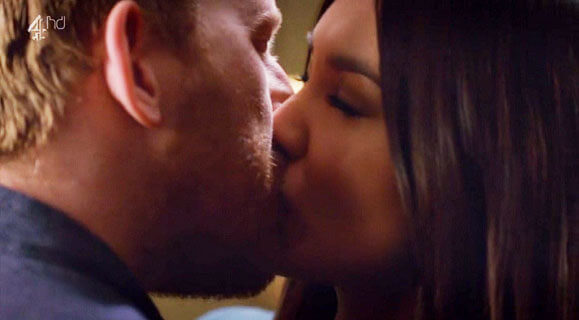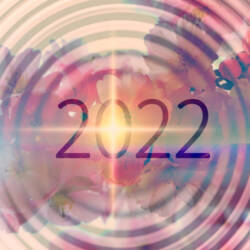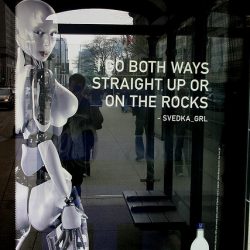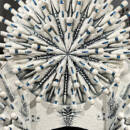Did You See That Shocking Robot Sex Scene in Humans, Channel 4’s New Sci-Fi Hit?
TV series explores the sexual politics of robotic romance.
In recent years, pop culture has developed a fixation on sex robots. Films like Her, Ex Machina, and Automata (or even the more low-tech Lars and the Real Girl), have all discussed the idea of sexual attraction between humans and robots.
Now a joint production from American network AMC and British public broadcaster Channel 4 is looking to continue the conversation with the exciting new TV series Humans (stylized as HUM∀NS).
Adapted from the earlier Swedish series Real Humans, the story takes place in a near future where humanoid robots (known as Synths) are widely available to consumers. Over eight hour-long episodes, Humans goes on to examine the effect an industry of service robots would have on society.
Captivated viewers have also been driving Humans to trend on Twitter, expressing a variety of complicated feelings about the show—many of which revolved around issues of consent:
Which means I went to bed last night worried about the moral grey area of vibrator use, because of course I did. #Humans
— Janet ? Lynn (@Weez) July 6, 2015
As far as I'm concerned, that really was not consensual sex. #Humans is certainly thought-provoking… and scary!
— Pollypoptart (@Pollypoptart) July 5, 2015
Commanding a synth to have sex with you is just a slippery slope #Humans
— Millie (@MillieSansoye) July 5, 2015
Featuring a blend of philosophical examination, narrative intrigue, and emotional drama, Humans has become Channel 4’s highest rated drama since 1992, with The Guardian describing it as being “one of 2015’s dramatic hits.”
However, beyond the critical acclaim and social commentary, Humans has caused a stir online for more titillating reasons. It seems that the show’s continued focus on robotic sex is proving fascinating to viewers. This culminated in an outsized reaction to last week’s episode, when husband and father Joe Hawkins sleeps with his recently purchased Synth, Anita.
But rather than positioning it as an erotic fantasy, the camera’s gaze depicts this encounter as clinical and awkward. Isolating angles and blocking are used to emphasize Joe’s lonely desperation, and the coldly impersonal nature of their tryst.
"How do I turn you off?" I don't think you ever turned her on in the first place Joe so don't worry about it #Humans
— Helen ? (@helerrrn) July 5, 2015
Most awkward after-sex scene goes to #Humans
— The English Simmer ⋄ (@EnglishSimmer) July 5, 2015
This house sharply divided on whether sex with robot butler = an affair, or just advanced wanking. #Humans
— Jim Martin (@JimSpim) July 5, 2015
The episode also continued its examination of robots and sexual politics with a sequence following Joe’s teenage children as they attend a friend’s underage house party. Rebellious daughter Mattie stops a Synth from being sexually assaulted by a buffoonish classmate in an overt parallel with date rape. Meanwhile, her brother Toby chooses to reject the flirtations of a friendly classmate due to his burgeoning crush on Anita.
The original Swedish series also features robotic sex in a prominent fashion, portraying it as taboo, yet widespread. People who choose to engage in physical or romantic relationships with Hubots (as they’re known in the Swedish version) are mocked with the derogatory slur “Hubbies.”
Real Humans takes this idea to its logical conclusion, featuring robot prostitution, trafficking, and even Hubot sex clubs.
It’s also worth noting that in comparison to Humans, the robot relationships in films such as Her and Ex Machina have received significantly muted responses from the public. It’s unclear if this is the result of a greater focus on sex instead of romance, or Humans’s resistance to glamourizing its own subject matter.
While much of the controversy surrounding this week’s episode has fixated on questions about objectification, consent, and rape culture, for others it might simply hit too close to home. It’s becoming increasingly common for people to develop sentimental feelings for their devices, and modern culture is replete with examples—from smart phone separation anxiety to the fandom for Siri’s voice, or even the way we confer personality onto our cars.
While robotic sex is often treated as fodder for comedy, the success of Humans is proving that viewers want to know what will happen when the sexbots arrive.
What did you think about the episode’s robot sex scene?
Image Source: Channel 4
8 comments
Leave a reply
You must be logged in to post a comment.



















I find it interesting that we are only talking about this now after the not-a-sex-bot had sex on the show. Every episode I’ve seen so far has involved the rape of the other sexualized synth.
There could be a number reasons for this. Part of it might be that Joe is a central character as opposed to the unnamed clients from the Synth Brothel.
But I think it primarily comes down to a difference in characterisation. Niska has been shown to be one of the rare Synths that possesses a consciousness and free will. Despite still being a machine, she demonstrates a clear capacity to think and act like a human being.
Comparatively Anita is still portrayed as robotic, passive and (for the most part) incapable of independent thought. Presumably this also translates to an increase in the uncanny valley factor, which might be behind the larger public response.
Since Niska seems more human in her behaviour, it’s possible the sex scenes featuring her may subsequently be less shocking to viewers.
I think that brutal rape is considered less shocking is what bothers me…. One day last week I watched an early episode from five different TV shows / seasons and Every. Single. One. used the brutal rape of a woman or child character to advance the story of a male lead.
It’s just such lazy character development and such obvious shock-value creation. We are meant to care about this rape because we are meant to care about the *rapist* and I am just so sick of that same narrative being played out over and over and over again.
While it is sadly revealing just how often rape is used as a cheap narrative shorthand, I’m not sure that’s what’s happening here.
Although many series do feature rape for nothing more than grotesque shock value, Humans seems to use it as a vehicle for examining complicated ideas about consent and objectification.
(By the way which episodes are you referring to? As far as I can remember, the only actual rape scene featuring Niska is in episode 1. She murders a paedophilic client and escapes the Synth brothel in episode 2.)
I’m also extremely sick of continually seeing rape used as fodder for lazy shock based storylines—but from what I’ve observed so far, Humans seems to be taking a more cerebral (for TV anyway) approach.
Additionally, I’m confused about where you picked up the idea that we’re meant to sympathise with Joe’s actions, or find him in any way likeable.
Much of the discourse surrounding Humans has focused on how Joe is a needy and resentful man who seems distant and uninterested in his own children.
In fact I’d say that a majority of the main characters are intended to be unlikeable by design. With the possible exception of Dr Millican and D.I. Karen Voss, the protagonists are almost all shown to possess various compromising personality flaws.
Consider Laura’s frequent parental absenteeism, or her (at least initially) outspoken distaste for Synths.
Joe and Laura’s children are shown to be equally straddled with dysfunction. Wannabe sociopath Mattie points a gun at Anita during one of their earliest encounters, while chip off the old block Toby later attempts to grope her in the night.
Even the breakdown of D.S. Pete Drummond’s marriage is shown to have multiple factors. While he’s clearly portrayed as the one at fault due to his violent insecurity and impotent rage, many commenters have also observed that his wife Jill’s relationship with her Synth appears at times to segue from friendly to flirty.
(In fact if the British version follows the Swedish original closely, then Jill eventually does enter into a sexual relationship with her Synth, before selling him to a trafficker when she grows tired of his increasingly autonomous personality.)
Humans approach to its characters seems quite heavily rooted in a classic misanthropic cynicism, where (for the most part) people are depicted as behaving more inhumanely than the robots that serve them.
Additionally, I’m confused about where you picked up the idea that we’re meant to sympathise with Joe’s actions, or find him in any way likeable.
Much of the discourse surrounding Humans has focused on how Joe is a needy and resentful man who seems distant and uninterested in his own children.
In fact I’d say that a majority of the main characters are intended to be unlikeable by design. With the possible exception of Dr Millican and D.I. Karen Voss, the protagonists are almost all shown to possess various compromising personality flaws.
Consider Laura’s frequent parental absenteeism, or her (at least initially) outspoken distaste for Synths.
Joe and Laura’s children are shown to be equally straddled with dysfunction. Wannabe sociopath Mattie points a gun at Anita during one of their earliest encounters, while chip off the old block Toby later attempts to grope her in the night.
Even the breakdown of D.S. Pete Drummond’s marriage is shown to have multiple factors. While he’s clearly portrayed as the one at fault due to his violent insecurity and impotent rage, many commenters have also observed that his wife Jill’s relationship with her Synth appears at times to segue from friendly to flirty.
(In fact if the British version follows the Swedish original closely, then Jill eventually does enter into a sexual relationship with her Synth, before selling him to a trafficker when she grows tired of his increasingly autonomous personality.)
Humans approach to its characters seems quite heavily rooted in a classic misanthropic cynicism, where (for the most part) people are depicted as behaving more inhumanely than the robots that serve them.
While it is sadly revealing just how often rape is used as a cheap narrative shorthand, I’m not sure that’s what’s happening here.
Although many series do feature rape for nothing more than grotesque shock value, Humans seems to use it as a vehicle for examining complicated ideas about consent and objectification.
(By the way which episodes are you referring to? As far as I can remember, the only actual rape scene featuring Niska is in episode 1. She murders a paedophilic client and escapes the Synth brothel in episode 2.)
I’m also extremely sick of continually seeing rape used as fodder for lazy shock based storylines—but from what I’ve observed so far, Humans seems to be taking a more cerebral (for TV anyway) approach.